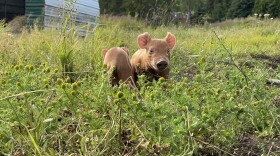As winter tightens its grip on the Lower Peninsula, we learn how one local pasture-land livestock farm takes care of its critters as the season turns cold, on the last episode of the year of “Homer Grown with Desiree Hagen.”
Eyrn Young and Beau Burgess are two of the owners of Blood, Sweat, and Food Farms on East End Road.
“I think the biggest change in the winter is that just because of the nature of the ground with ice and snow, the animals don't move as much as they would in the summertime. Simply because setting fences is a little bit more difficult in the winter, and there's really no need for them to move as much because the ground isn't being as impacted,” Young said. “But one of the things that we also do for the winter time is we “deep-bed” a lot of our animals. Which essentially just means that say for the sheep or our layer chickens, rather than like mucking out the layer chickens, coop, basically every week so that they have fresh bedding. What we actually do is we continually add a layer of wood chips to the bottom of their coop. And then it's called deep bedding and basically just accumulate to the winter. And then during the winter, we actually turn that in the layer mulch and some of the other animals and turn that under so that it's composting through the winter. And this does a couple of different things. One is that it actually keeps it warmer in that area because of the composting action of those wood chips and the feces that are being dropped. It also allows them to have access to nice new, fresh bedding. And then as it composts down, even in the wintertime, you know, we'll see like little worms and little bugs hanging out and the chickens get to enjoy those as we turn it. So it ends up being a pretty good system.
“Pretty much we have two completely different systems for summer and winter,” Burgess said. “Winter is really just about creating beautiful compost with animal feces and then spreading that on the fields. In the spring time or summer is about sending animals out on those fertile fields to harvest the nutrition in the form of grazing.”)
There are specific concerns unique to each animal.
“Because of a wet cold ground, you really need to select breeds and manage to keep feet from getting rot in the case of sheep or pigs. They really don't like this, the cold hard prickly ground very much so just making sure the animals have a place where they can go that has dry bedding, where they can dry their feet out and chill out a little bit. I'd say foot health is a big one,” Burgess said. “Chickens too, just giving them the ability to move around.”
“I think one of the things that is often overlooked is just dehydration,” Young said. “Just making sure that they have access to unfrozen water at all times. That's a big, sometimes a big challenge in the winter, especially if you don't have access to electricity.”
Hagen asked the pair what they looked out for when caring for their critters to make sure they’re thriving.
“When a pig is happy, their tail curls up. So if you ever see a pig with kind of a limp tail, you're like, ‘Oh buddy, what's wrong? Like, how are you feeling?’” Young said. “For just basic stuff that we're looking for in our animals is their level of activity. Like, are they mentally engaging with their environment? You know, are they bright eyed. Are they, you know, like active and rooting around, in the pigs case or chickens case, do they, do they look stimulated? Do they look like they're moving physically? We're looking at their coat, you know, the pigs in the summertime, they tend to, to shed their hair and their hair gets thinner, but in the winter time, it comes in. And if it's really shiny and glossy and looks really healthy, just like a human's hair, that tells me that their nutrition is on point that I'm doing well with what I'm feeding them. Just pretty much anything that you would see in a healthy, engaged, active human, that's kind of what we're looking for in our animals.”
You can hear the whole episode of Homer Grown with Desiree Hagen online now, archived here on KBBI.
From 'Homergrown:' Winterizing livestock

Blood Sweat and Food Farms




